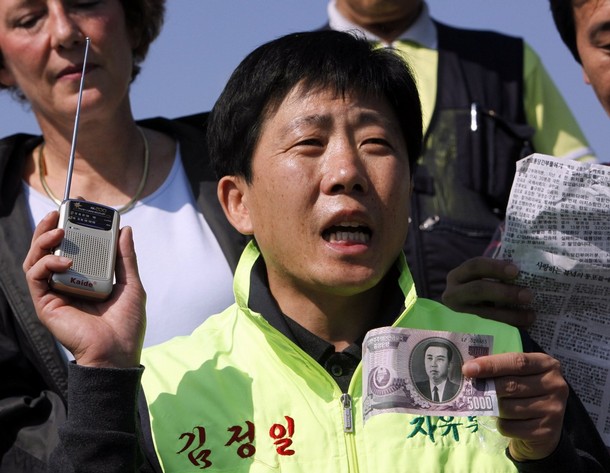
North Korea remains the most isolated country on earth, with its people effectively cut off from the outside world—or so the world has been told. But there is reason to believe this is no longer the case. My research suggests millions of North Koreans listen to or hear about foreign radio broadcasts. There is evidence the numbers are growing. This is all the more amazing given that North Korean authorities distribute only radios with fixed dials, assiduously jam foreign broadcasts, and send citizens caught listening to foreign radio to the country’s notorious gulags for as long as 10 years.
North Koreans willing to tamper with their government radios or buy a $3 radio smuggled in from China have a wide range of choices. Over a dozen radio stations from the United States, South Korea and Japan currently broadcast to North Korea. Voice of America (VOA), one of the most popular stations, has been broadcasting to the North since 1942, while the equally popular Radio Free Asia (RFA) began its Korean service soon after its establishment by Congress in 1997. VOA focuses on news of the U.S. and the world, while RFA concentrates on North Korea and life for the nearly 20,000 defectors in the South.
North Korean defectors themselves have also created three stations in recent years, led by Free North Korea Radio (FNK Radio). These stations employ stringers in North Korea who communicate by cell phone or smuggle out interviews through China. As a result, information is flowing in and out of the North more rapidly than ever. For example, when authorities undertook major economic reforms in 2002, it was months before the rest of the world knew. In contrast, when the regime launched a disastrous currency reform in November, FNK Radio filed a report within hours.
It’s impossible to count how many North Koreans listen to these stations, but there is anecdotal evidence the numbers are significant. For starters, on dozens of occasions, authorities in Pyongyang have used their own media to attack foreign broadcasters. The North reserves the insult "reptile" exclusively for foreign broadcasters. Last month, the regime likened defector broadcasters to "human trash." Ironically, this diatribe also contained the first official mention that the botched currency revaluation had taken place. Foreign broadcasters not only struck a nerve, but also forced the regime to discuss developments it would prefer to ignore. If the broadcasts were not being listened to, the regime would ignore them instead of lavishing free publicity.
Meanwhile, broadcasters to North Korea frequently receive heartbreaking messages of thanks from North Koreans in China. One listener on RFA’s Web site described RFA as "our one ray of hope." Over the past several years, South Korean researchers have quietly interviewed thousands of North Korean defectors, refugees, and visitors to China about their listening habits. One unpublished survey conducted last summer of North Koreans in China found that over 20% had regularly listened to the banned broadcasts, and almost all of them had shared the information with family members and friends. Several earlier studies confirm these findings.
The key determinant of a station’s popularity seems to be how well its reports jibe with the grim facts which North Koreans see in their everyday lives. South Korea’s "Global Korean Network" has been declining in popularity since it ceased to focus on North Korea and adopted a decidedly soft approach in 1998 after South Korean voters elected a president favoring accommodation with the North.
While we must be careful not to draw too many conclusions from samples that are far from random, it is not unreasonable to surmise that there are more than a million surreptitious listeners in a population of 24 million. The North Korean regime is not only losing its monopoly on the control of information; outside broadcasts are also undermining loyalty to the regime. Defectors cite foreign radio-listening as one of the leading motivations to defect.
That opens the possibility that radio could play the same role in prying open North Korea that it did in Eastern Europe. Lech Walesa, Poland’s first democratically elected president, insists, "Without Western broadcasting, totalitarian regimes would have survived much longer." At the height of the Cold War, one-quarter of the Russian public was listening to jammed and banned broadcasts by the Voice of America (VOA), Radio Liberty and Radio Free Europe. The radios (FL/RFE) knew this based on interviews at that time with over 50,000 Russian travelers and émigrés. Recently opened Soviet archives confirm these survey results.
We can do much more to improve broadcasting to North Korea. VOA and RFA only broadcast five hours a day, and the defector stations limp along on shoestring budgets due to widespread public indifference in South Korea. President Obama’s human-rights envoy for North Korea, Robert King, has pledged to expand funding for Korean broadcasting. Pyongyang claims that foreign broadcasts are part of the Obama administration’s "hostile policy" toward the North. But North Koreans deserve to hear the truth—not only about their own country, but also the world at large.
The seeds of change are being planted. It may take years for North Koreans to act on the information they are receiving, but that does not mean we should not be doing everything we can to encourage that process.
Peter Beck, an Atlantic Council nonresident senior fellow, is the Pantech Research Fellow at Stanford University’s Asia Pacific Research Center. This essay previously appeared in the Wall Street Journal. Photo credit: Reuters Pictures.
Image: north-korea-radios.jpg
